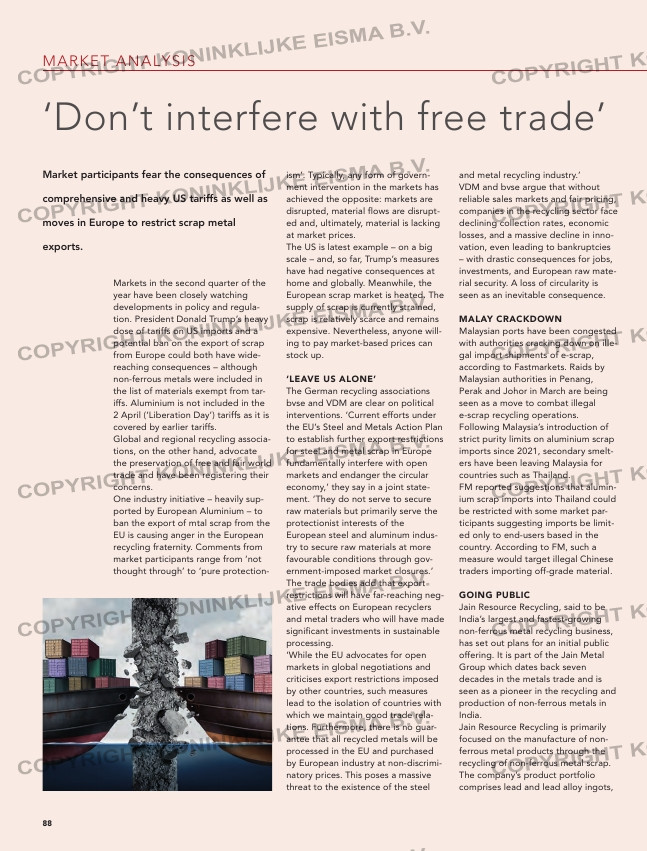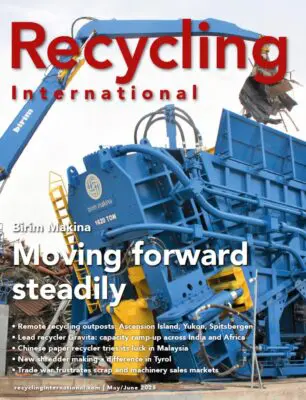Page 88 from: Recycling International May/June issue

MARKET ANALYSIS
‘Don’t interfere with free trade’
Market participants fear the consequences of
comprehensive and heavy US tariffs as well as
moves in Europe to restrict scrap metal
exports.
copper and copper ingots and alu-
minium and aluminium alloys.
RECYCLING FIRST
Novelis has announced the produc-
tion of the first aluminium coil made
entirely from 100% recycled automo-
tive scrap. The pilot material is said to
be suitable for car body out skin
applications, meeting the highest
requirements for surface quality and
formability. Scrap for the recycled coil
was sourced through the Automotive
Circularity Platform (ACP), which aims
to streamline access to high-quality,
end-of-life material for recycling by
digitalising the secondary materials
market, enhancing supply chain effi-
ciency, and maximising material
recovery from end-of-life vehicles.
Novelis is now working to widen the
adoption of this technology, enabling
automakers to incorporate higher
recycled content into future designs.
Michael Hahne, vp and general man-
88
ism’. Typically, any form of govern-
ment intervention in the markets has
achieved the opposite: markets are
disrupted, material flows are disrupt-
ed and, ultimately, material is lacking
at market prices.
The US is latest example – on a big
scale – and, so far, Trump’s measures
have had negative consequences at
home and globally. Meanwhile, the
European scrap market is heated. The
supply of scrap is currently strained,
scrap is relatively scarce and remains
expensive. Nevertheless, anyone will-
ing to pay market-based prices can
stock up.
‘LEAVE US ALONE’
The German recycling associations
bvse and VDM are clear on political
interventions. ‘Current efforts under
the EU’s Steel and Metals Action Plan
to establish further export restrictions
for steel and metal scrap in Europe
fundamentally interfere with open
markets and endanger the circular
economy,’ they say in a joint state-
ment. ‘They do not serve to secure
raw materials but primarily serve the
protectionist interests of the
European steel and aluminum indus-
try to secure raw materials at more
favourable conditions through gov-
ernment-imposed market closures.’
The trade bodies add that export
restrictions will have far-reaching neg-
ative effects on European recyclers
and metal traders who will have made
significant investments in sustainable
processing.
‘While the EU advocates for open
markets in global negotiations and
criticises export restrictions imposed
by other countries, such measures
lead to the isolation of countries with
which we maintain good trade rela-
tions. Furthermore, there is no guar-
antee that all recycled metals will be
processed in the EU and purchased
by European industry at non-discrimi-
natory prices. This poses a massive
threat to the existence of the steel
and metal recycling industry.’
VDM and bvse argue that without
reliable sales markets and fair pricing,
companies in the recycling sector face
declining collection rates, economic
losses, and a massive decline in inno-
vation, even leading to bankruptcies
– with drastic consequences for jobs,
investments, and European raw mate-
rial security. A loss of circularity is
seen as an inevitable consequence.
MALAY CRACKDOWN
Malaysian ports have been congested
with authorities cracking down on ille-
gal import shipments of e-scrap,
according to Fastmarkets. Raids by
Malaysian authorities in Penang,
Perak and Johor in March are being
seen as a move to combat illegal
e-scrap recycling operations.
Following Malaysia’s introduction of
strict purity limits on aluminium scrap
imports since 2021, secondary smelt-
ers have been leaving Malaysia for
countries such as Thailand.
FM reported suggestions that alumin-
ium scrap imports into Thailand could
be restricted with some market par-
ticipants suggesting imports be limit-
ed only to end-users based in the
country. According to FM, such a
measure would target illegal Chinese
traders importing off-grade material.
GOING PUBLIC
Jain Resource Recycling, said to be
India’s largest and fastest-growing
non-ferrous metal recycling business,
has set out plans for an initial public
offering. It is part of the Jain Metal
Group which dates back seven
decades in the metals trade and is
seen as a pioneer in the recycling and
production of non-ferrous metals in
India.
Jain Resource Recycling is primarily
focused on the manufacture of non-
ferrous metal products through the
recycling of non-ferrous metal scrap.
The company’s product portfolio
comprises lead and lead alloy ingots,
Markets in the second quarter of the
year have been closely watching
developments in policy and regula-
tion. President Donald Trump’s heavy
dose of tariffs on US imports and a
potential ban on the export of scrap
from Europe could both have wide-
reaching consequences – although
non-ferrous metals were included in
the list of materials exempt from tar-
iffs. Aluminium is not included in the
2 April (‘Liberation Day’) tariffs as it is
covered by earlier tariffs.
Global and regional recycling associa-
tions, on the other hand, advocate
the preservation of free and fair world
trade and have been registering their
concerns.
One industry initiative – heavily sup-
ported by European Aluminium – to
ban the export of mtal scrap from the
EU is causing anger in the European
recycling fraternity. Comments from
market participants range from ‘not
thought through’ to ‘pure protection-
A U T H O R Robin Latchem P H O T O Shutterstock
88-89-90-91_manonferrous12adv.indd 88 10-04-2025 16:17



